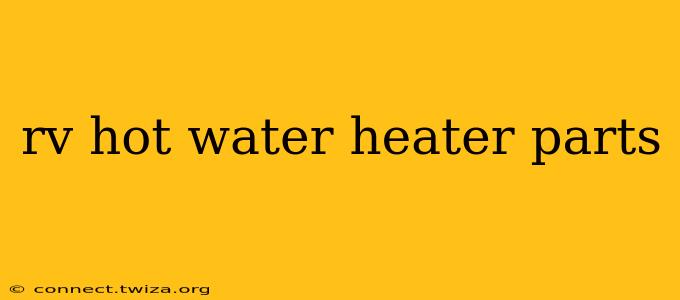Maintaining your RV's hot water heater is crucial for comfortable camping. Understanding its components and how they function is key to preventing breakdowns and ensuring hot showers on the road. This guide dives deep into the essential parts of an RV hot water heater, addressing common questions and offering helpful tips for maintenance and repair.
What are the main parts of an RV hot water heater?
An RV hot water heater, whether gas or electric, comprises several key components working in harmony. These include:
-
Tank: This is the main container holding the water. Tanks are typically constructed from durable materials like stainless steel or coated steel to resist corrosion. The size of the tank dictates the amount of hot water available.
-
Heating Element (Electric): Electric water heaters use an electric heating element immersed in the water to raise its temperature. These elements can burn out over time, requiring replacement.
-
Burner Assembly (Gas): Gas water heaters utilize a burner assembly, typically fueled by propane or LP gas, to heat the water. This assembly includes the burner, igniter, thermocouple, and gas valve.
-
Anode Rod: This sacrificial rod protects the tank's interior from corrosion. It's made of a metal that corrodes more readily than the tank, drawing corrosive elements away from the tank walls. Regular inspection and replacement are crucial.
-
Pressure Relief Valve: This safety device releases excess pressure from the tank, preventing explosions caused by overheating or pressure buildup. It should be tested regularly by lifting the lever.
-
Water Inlet Valve: This valve controls the inflow of cold water into the tank.
-
Water Outlet Valve: This valve controls the outflow of hot water from the tank.
What size is my RV hot water heater?
RV hot water heater tank sizes commonly range from 6 gallons to 10 gallons. The appropriate size depends on the number of occupants and their hot water usage habits. Larger RVs often feature larger tanks, while smaller units may use smaller, more space-saving models. Checking your RV's specifications or the hot water heater itself will reveal the tank's capacity.
How do I know if my RV hot water heater needs repair?
Several signs indicate a problem with your RV's hot water heater:
-
No hot water: This is the most obvious sign. Check the gas supply, electric power, and circuit breaker.
-
Leaking water: Leaks suggest a problem with the tank, valves, or pressure relief valve.
-
Strange noises: Unusual sounds, like rumbling or banging, could signal sediment buildup or other internal issues.
-
Weak hot water flow: Reduced flow may indicate sediment buildup, a partially clogged valve, or problems with the heating element.
-
Gas odor: A strong gas smell indicates a leak in the gas lines or burner assembly—requiring immediate attention.
How often should I replace my RV hot water heater anode rod?
The lifespan of an anode rod depends on the water quality. Hard water depletes the rod faster. It's generally recommended to inspect the anode rod annually and replace it every 2-3 years, or sooner if it's significantly corroded. A corroded anode rod indicates it's doing its job and protecting your tank, but it needs replacing to continue the protection.
How do I flush my RV hot water heater?
Regular flushing removes sediment buildup that reduces efficiency and can damage the heater. The process involves draining the tank, then running water through it to dislodge sediment. Consult your water heater's manual for specific instructions, as the process can vary slightly depending on the model. This is a crucial maintenance step to extend the life of your RV hot water heater.
How do I replace my RV hot water heater?
Replacing an RV hot water heater is a more complex task best left to professionals unless you are experienced with plumbing and gas appliance installation (for gas models). Incorrect installation can lead to dangerous leaks or gas hazards. It's generally recommended to contact a qualified RV technician for this repair.
By understanding the various components and performing routine maintenance, you can ensure your RV's hot water heater delivers reliable hot water for many years to come. Remember to always consult your owner's manual for specific instructions and safety guidelines.
